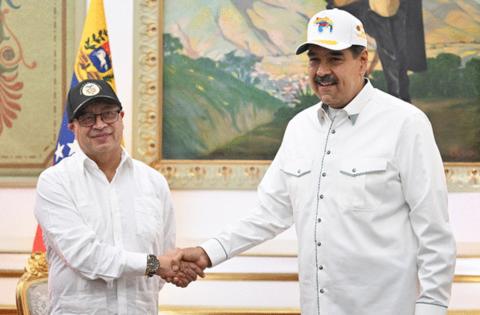Venezuelan regime warns of alleged bomb plot targeting US Embassy
Published in News & Features
The Nicolás Maduro regime claims to have uncovered a plot by extremist members of the Venezuelan opposition to plant explosives at the U.S. Embassy in Caracas, in what officials describe as a planned “false flag” operation aimed at triggering a wider conflict between the two countries.
Interior Minister Diosdado Cabello, who oversees Venezuela’s security apparatus, said Monday that diplomatic police have been in contact with U.S. officials to coordinate security measures. He added that Washington had received the information “with the seriousness the case deserves.”
Cabello, considered the most powerful figure in Venezuela after Maduro, blamed the alleged plot on the “desperation” of extremist opposition factions. He named opposition leader María Corina Machado and former police commissioner Iván Simonovis as the “architects of violent acts,” though he did not provide evidence to support the claims.
The accusations come amid heightened tensions between Washington and Caracas, and follow comments by National Assembly President Jorge Rodríguez, who on Sunday said “extremist sectors of the local right” were preparing an attack involving “lethal explosives” targeting the U.S. Embassy.
Rodríguez said the Maduro government had alerted Washington through “three different channels” and had also informed a European diplomatic mission. “At the same time, we have reinforced security measures at that diplomatic facility, which our government respects and protects,” Rodríguez said in a statement posted on his Telegram channel.
The U.S. and Venezuela severed formal diplomatic ties in 2019, after the first Trump administration recognized opposition leader Juan Guaidó as Venezuela’s interim president. Since then, communication between the two governments has been limited to issues such as humanitarian aid, migration and security.
The U.S. Embassy in Caracas has been effectively empty since March 2019, when the State Department suspended operations and withdrew all diplomatic personnel following the breakdown of relations with the Caracas regime. All consular services remain suspended, and no U.S. diplomats or staff are available to assist American citizens. While the embassy compound is closed, it is maintained by a small team of local Venezuelan contractors and guarded externally by Venezuelan police patrols.
The latest warnings coincide with an expanded U.S. military presence in the Caribbean, officially described by Washington as an anti-narcotics operation targeting drug trafficking routes linked to Venezuela. Caracas has condemned the deployment as a “provocation” and an attempt to create conditions for a conflict and an eventual regime change.
U.S. officials say at least five strikes have been carried out since September on suspected drug-smuggling vessels operating in Caribbean waters. On Sunday, President Donald Trump suggested that future operations could take place “by land.”
Asked by reporters what’s next on the administration’s campaign against the Venezuelan drug cartels, White House Press Secretary Karoline Claire Leavitt said she could not reveal details of what is being discussed. “I won’t get into any specific proposals that are being considered by the President and his national security team, but I think we’ve been pretty transparent and clear in the administration’s view of the illegitimate Maduro regime,” she said.
Washington has long accused elements of the Maduro regime of being involved in large-scale narcotics trafficking. U.S. intelligence agencies say key figures within the regime are connected to the so-called Cartel de los Soles, a shadowy network believed to be responsible for cocaine shipments from Venezuela to markets in North America and Europe.
In a memo sent to lawmakers last week, the Trump administration justified the strikes on boats by the U.S. military by designating drug cartels as “unlawful combatants,” and stated that the U.S. is engaged in a “non-international armed conflict” with the groups. The maritime campaign, which began early last month, has reportedly resulted in at least 21 deaths.
The deployment marks the largest U.S. military presence in the region in decades. The first phase includes a Marine air-ground task force aboard the USS Iwo Jima, two San Antonio-class amphibious ships and over 2,000 Marines ready for rapid-response missions.
In total, more than 4,500 U.S. Navy and Marine personnel are currently operating in the Caribbean, backed by a cruiser, several destroyers and a Los Angeles-class attack submarine equipped with precision-guided missiles. Ten F-35 stealth fighters have also been stationed in Puerto Rico, significantly outmatching Venezuela’s aging fleet of Russian-made Sukhoi Su-30s and U.S.-built F-16s.
In response, Maduro has sought international support. Foreign Minister Yván Gil said Maduro recently sent a letter to Pope Leo XIV requesting his “special support” to “consolidate peace” in Venezuela. During the past few days, the Venezuelan armed forces have conducted a number of military drills, which Maduro has said that are aimed at reinforcing “territorial security” amid what he described as foreign threats.
_____
(McClatchy Washington Bureau reporter Emily Goodin contributed to this story.)
_____
©2025 Miami Herald. Visit miamiherald.com. Distributed by Tribune Content Agency, LLC.







Comments